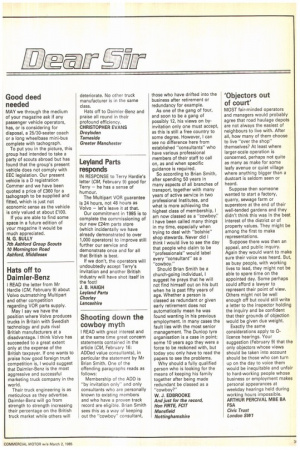'Objectors out of court'
Page 37

If you've noticed an error in this article please click here to report it so we can fix it.
MOST fair-minded operators and managers would probably agree that road haulage depots are not always the easiest of neighbours to live with. After all, how many of them choose to live "over the shop" themselves? At least where larger-scale operation is concerned, perhaps not quite as many as make for some leafy avenue or quiet village where anything bigger than a dustcart is seldom seen or heard.
Suppose then someone wanted to start a factory, quarry, sewage farm or superstore at the end of their well-tended gardens and they didn't think this was in the best interest of the district or of property values. They might be among the first to make representations.
Suppose there was then an appeal, and public inquiry. Again they would want to make sure their voice was heard. But, as busy people, with working lives to lead, they might not be able to spare time on the appointed day. Some perhaps could afford a lawyer to represent their point of view. Others might not be well enough off but could still write a letter to the inspector holding the inquiry and be confident that their grounds of objection would be given due weight.
Exactly the same considerations apply to 0licence hearings. Your suggestion (February 9) that the only objectors whose views should be taken into account should be those who can turn up on the day to voice them would be inequitable and unfair to hard-working people whose business or employment makes personal appearances at weekday hearings held during working hours impossible. ARTHUR PERCIVAL MBE BA FSA Civic Trust London SW1
























































































